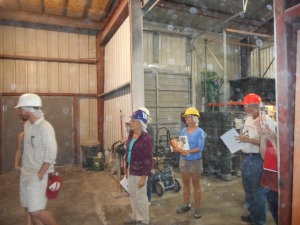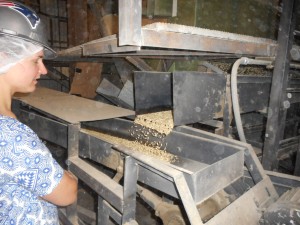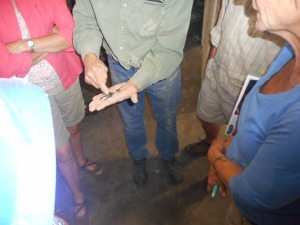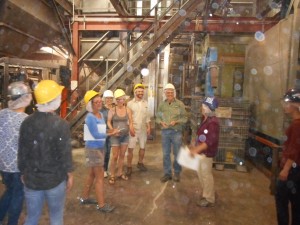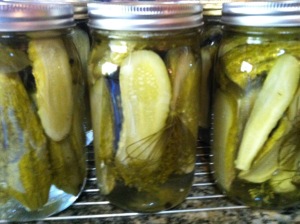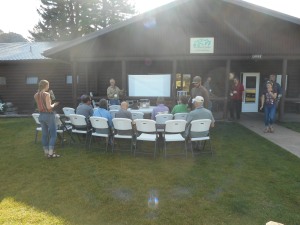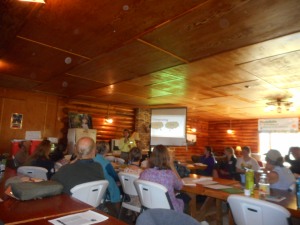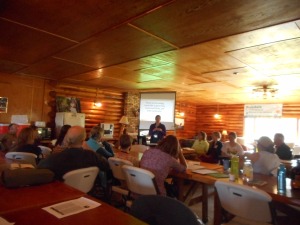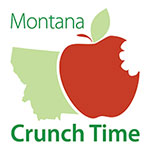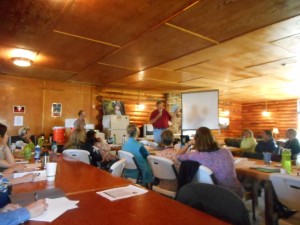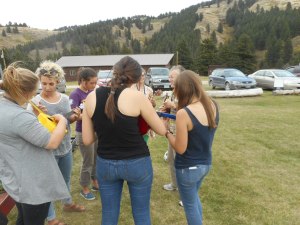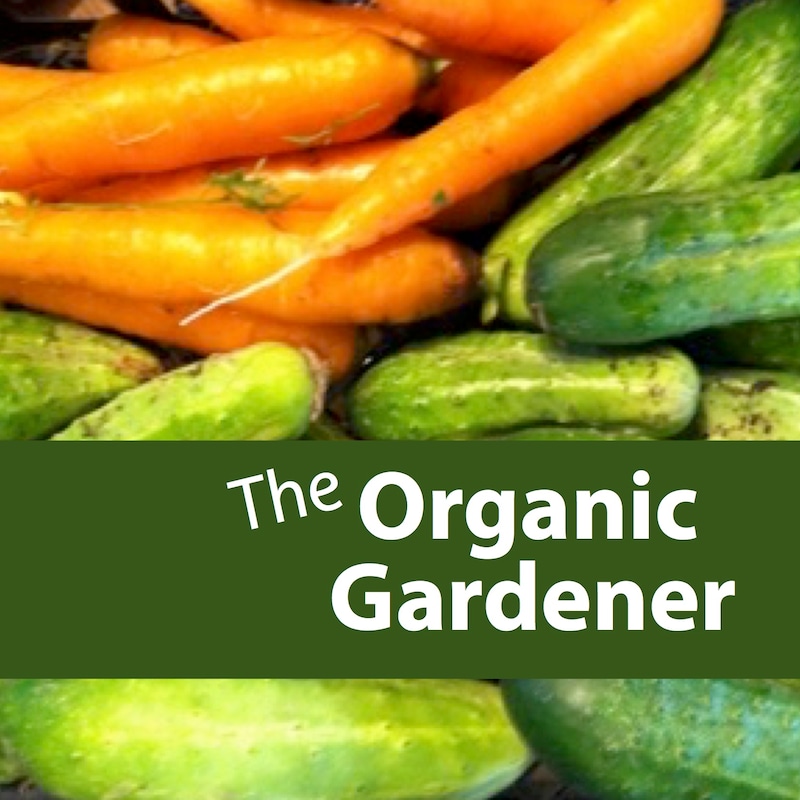
Shownotes
Here are my biggest take aways from this weekends amazing workshops and gathering of like minded souls in Montana’s beautiful fall weather!
AERO stands for Alternative Energy Resource Organization but AEROMT is so much more then that. Their tag line: Linking People, Sustainable Agriculture, and Energy Solutions since 1974 says it best!
The weekend started out with a trip over Logan’s Pass:
Friday morning in Great Falls.


Although we didn’t make it up to the giant falls we did some beautiful wildlife including a pelican and lots of waterfowl.
Then off to the amazing Timeless Seeds Processing Plant!
David Oien gives an amazing talk on lentils.
Then we got a tour of the processing plant.
Nikki who teaches 2nd grade shared her amazing video with us!
Organic Black Beluga® Lentils are nutritious and full of protein!
2016 is going to be the Year of the Pulse Crops.
“Pulses are annual leguminous crops yielding between one and 12 grains or seeds of variable size, shape and colour within a pod, used for both food and feed. The term “pulses” is limited to crops harvested solely for dry grain.
Pulse crops such as lentils, beans, peas and chickpeas are a critical part of the general food basket. Pulses are a vital source of plant-based proteins and amino acids for people around the globe and should be eaten as part of a healthy diet to address obesity, as well as to prevent and help manage chronic diseases such as diabetes, coronary conditions and cancer; they are also an important source of plant-based protein for animals.
In addition, pulses are leguminous plants that have nitrogen-fixing properties which can contribute to increasing soil fertility and have a positive impact on the environment.” from the UN’s Year of the Pulses Website.
After checking in at the Arrowpeak Lodge we started the expo off with a delicious cooking lesson on how to make lentil salad! The food was just one of the best parts of this weekend! Way to go cooks!
Claudia was full of knowledge about nutrition and taste as well as just a fun class!
Sarah Calhoun from Red Ants Pants gives an inspirational opening Keynote.
The audience is delighted with the information about the Red Ants Pants Festival and Red Ants Pants Foundation. Did she say they give out grants and money???? It looks like a lot of the grants they gave out last year went to help farms in Montana or school programs that support farm/ag education, women’s leadership participation among others. What a wonderful idea to combine music and sustainable agriculture and women’s empowerment!
The cake off was a complete success and I think but can’t be positive they said they raised almost $1000 in cake donations!

The real race was for the 2 gluten free options!
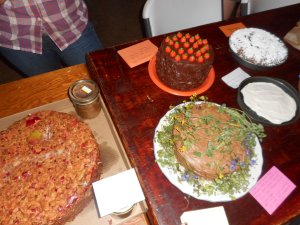
My huckleberry coffee cake was not the most popular I have to say, but that’s just cause they didn’t taste it! Haha!
Saturday Morning I awoke early to a delicious cup of coffee and engaging conversation with Jim Barngrover from Cafe Mam and Timeless Seeds.
Over coffee I participated in the AERO’s Energy Task Force meeting. We discussed ways to promote AERO energy projects and what projects members would like to focus on in the next year. The success of Director Jennifer Hill-Hart’s Tour this summer was a great way to get the word out and learn about what is going on around the state.
The Abundant Montana website which is a directory of farms, markets, etc around the state where people can shop for locally grown food and products as well as farmers can promote their wares. We also discussed the RePower Montana website which documents energy projects around the state.
One of the most exciting ideas was a workshop/rodeo that would teach people about AERO and the different programs it supports. I really like the vision of the task force which is to make Alternative Energy INEVITABLE!
Then I went to my first workshop session on Cottage Foods Bill 478.
“Cottage food products” means foods that are not potentially hazardous and are processed or packaged in a cottage food operation, including jams, jellies, dried fruit, dry mixes, and baked goods. Other similar foods that are not potentially hazardous may be defined by the department by rule.”
I learned that Mike can bake his bread and cookies in our home kitchen and sell them among many other products like our eggs, and honey as long as we register with the state, provide the recipes including ingredients and procedures for his baked goods, there’s some specifics to go on the labels, and as long as the sale is FACE TO FACE, we’re good to go.
As for my salad dressing and pickles we would have to submit those recipes on an individual basis. The goal is to give small businesses a chance to get started and also to allow moms or grandpas etc to sell their goods easily if they don’t want to grow a business.
Old friends reunite as they share insights and ideas!
Those Millennials rocking it again. The UMT ESTV grad students were some of the best faces full of ideas at the AERO expo!
It was really hard to choose a workshop to go to.
Patti Armbrister was an amazing educator from the Hindsdale Schools on the East Side where she is single handedly changing the way our food is grown, distributed, and fed to our students.
Shay Farmer, Farm to Institution Program Manager for Mission Mountain Food Enterprise Center talked about October 26th at 2pm being Crunch time!
In celebration of Food Day and National Farm to School Month everyone around Montana should crunch into a local apple!
Mike Dalton from Gardens from Garbage encouraged everyone to go home on Monday and get started repurposing food because we have way too much wasted food and hungry kids and families in Montana.
Bruce Smith the Dawson County Extension Agent was an amazing story teller and educator with a great sense of humor!
I don’t know what those Millennials were doing here but it sure looked fun!
The Ukulele University not only looked fun but were some great musicians to entertain before dinner!
Dr. Laura Lengnick gave an amazing talk about her new book Resilient Agriculture: Cultivating Food Systems for a Changing Climate
She talked about the three parts of Climate Risk:
Exposure: how is your community experience change, for example are you experience droughts? Floods? What kind of physical precipitation changes are affecting your area.
Sesitivity: how is your community or farm being affected by the change?
and
Adaptive Capacity: your
Follow




